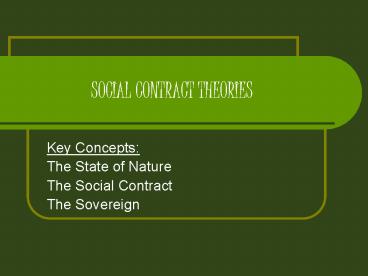SOCIAL CONTRACT THEORIES - PowerPoint PPT Presentation
1 / 8
Title:
SOCIAL CONTRACT THEORIES
Description:
... or (b) the people's elected officials/the people representing themselves. ... Hobbes: The initially elected absolute monarch/leadership ... – PowerPoint PPT presentation
Number of Views:95
Avg rating:3.0/5.0
Title: SOCIAL CONTRACT THEORIES
1
SOCIAL CONTRACT THEORIES
- Key Concepts
- The State of Nature
- The Social Contract
- The Sovereign
2
Key Concepts
- The State of Nature A pre-social condition.
- The Social Contract An agreement, real or
fictional, between (a) members of the community
or - (b) members of the community and the Sovereign.
- The Sovereign The legitimate head of state after
the Social Contract (a) a person or group of
persons, such as a monarch or a government, or
(b) the peoples elected officials/the people
representing themselves.
3
KEY PLAYERS IN SOCIAL CONTRACT THEORY
- Thomas Hobbes (1588-1679) Argues in favor of
absolute monarchy. - John Locke (1632-1704) Argues in favor of
representational democracy. - Jean-Jacques Rousseau (1712-1778) Argues in
favor of direct democracy. - Immanuel Kant (1724-1804) Argues in favor of a
representational system, but lead by a
monarch/government with the peoples interest at
heart. - John Rawls (1921-2002) Argues in favor of an
imaginary social contract within a democracy, an
Original Position.
4
VIEWS ON HUMAN NATURE
- Hobbes Humans are selfish by nature and must be
controlled. - Locke Humans are rational by nature, and can
by-and-large control themselves. - Rousseau Humans are good and compassionate by
nature, but have been corrupted by civilization. - Kant Humans are selfish by nature, but can
control themselves through rational,
universalized thinking. - Rawls Humans are selfish by nature, and the
Social Contract must be made attractive by
appealing to everyones self-interest.
5
VIEWS ON THE STATE OF NATURE
- Hobbes The State of Nature is a dangerous place,
and life of man is solitary, poor, nasty,
brutish, and short. States are in a State of
Nature vis-à-vis each other. - Locke The State of Nature exists any time humans
havent entered into an agreement with each other
to participate in a government. Even so, it is
not chaotic because of human rationality, and the
three natural rights to life, liberty, and
property. States are in a State of Nature
vis-à-vis each other. - Rousseau The State of Nature is a wonderful,
rich environment for early humans living solitary
peaceful lives. - Kant The State of Nature is a fiction the
Social Contract is a rational, moral concept
limiting the powers of the sovereign. States are
in a State of Nature vis-à-vis each other. - Rawls The State of Nature is a fantasy, but we
can use it to imagine creating a fair society.
6
THE SOVEREIGN
- Hobbes The initially elected absolute
monarch/leadership - Locke The people (all adult males) electing a
government in democratic elections - Rousseau The people (all adult males) vote on
all matters the people are the Sovereign - Kant The monarch/government accepting the
rational limitations of legislative power,
governing for the people. - Rawls Modern republican form of government.
7
EFFECTS OF THE SOCIAL CONTRACT
- Hobbes People will live in peace but without
rights except for the right to self-defense - Locke The three natural rights which exist in
the State of Nature will be easier to enforce by
the government. Those who have given express
consent will be bound by the contract those who
have given tacit consent can opt out and leave. - Rousseau Life will be fair for all if we employ
the general will and set aside our personal
interests. - Kant The people will be fairly represented by
the Sovereign without actually having to
participate. - Rawls We will have decided on a system that is
fair for everyone, using the Veil of Ignorance.
8
INfluences
- Hobbes Influenced Locke, and indirectly,
Jefferson - Locke Influenced Thomas Jefferson in his
Declaration of Independence - Rousseau Influenced Jefferson, to some extent,
but also Kant, Marx, the environmentalist
movement, respect for indigenous peoples, and
modern child pedagogy - Kant Influenced social philosophies and the
human rights concept with his theory of the
rights of rational human beings.































